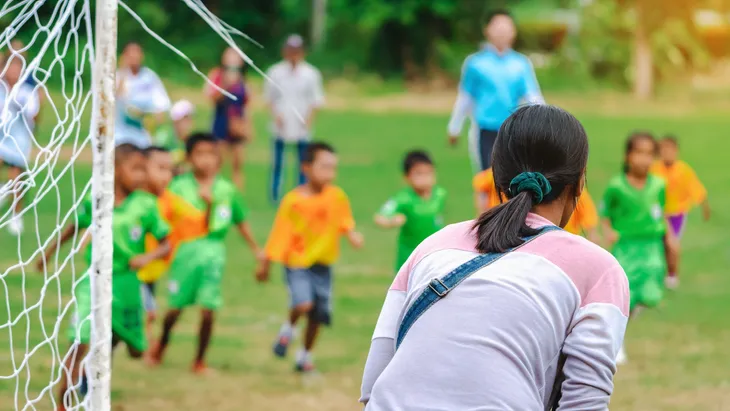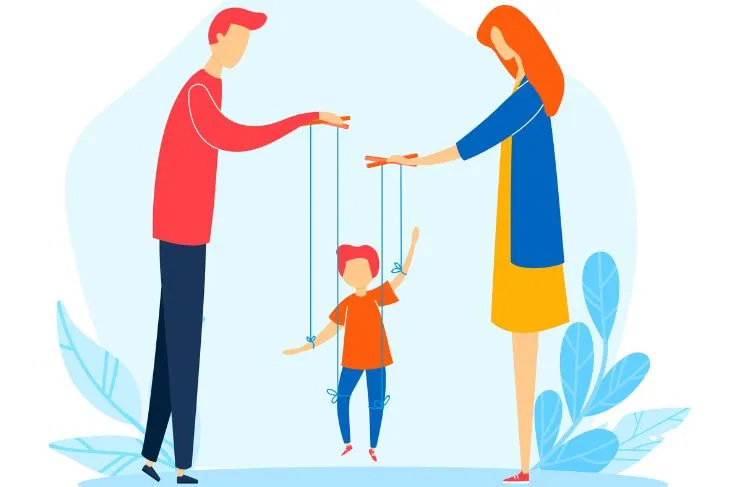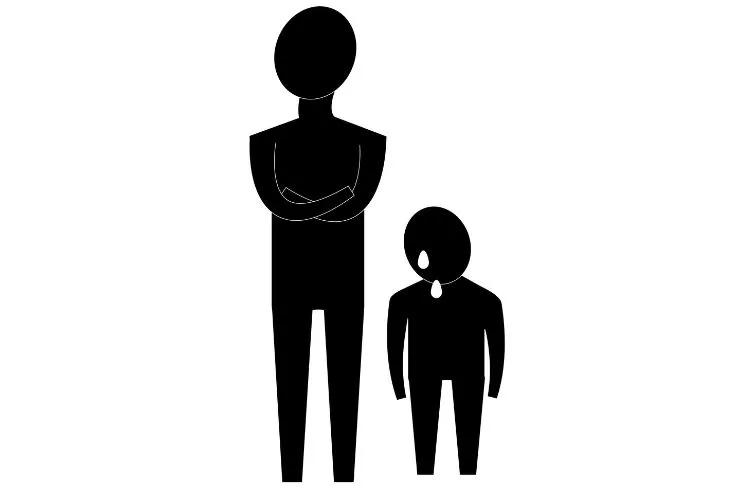- A narcissistic parent is someone who is incredibly controlling, possessive, self-centered, lacks empathy, and is manipulative of their child.
- They will brag about their children to inflate their own ego. If the conversation doesn’t benefit them in any way, they are uninterested.
- These parents dismiss their child’s feelings, but will be overly sensitive themselves and shift blame onto their children when possible.
- When dealing with a narcissistic parent its best to set clear boundaries, walk away when possible, and try not to take their behavior personally.
Being a parent is one of the hardest jobs in the world. It requires a lot of compassion, empathy, patience, and love — many traits you’d never find in a narcissist. So what happens when people with characteristics of narcissistic personality disorder, such as grandiosity, superiority, and entitlement become parents?
Psychologists refer to these people as narcissistic parents. It’s more than just bragging about kids or pushing them to their limit in extra curricular activities. It goes much deeper and can have serious, long-term effects on children. Here are the common signs of a narcissistic parent, as well as tips on how parents can change and what the children should do…
Use Kids as Validation and Portray a Superficial Image
It’s important to be supportive of children and cheer them on, but a narcissistic parent will take it to a whole other level. They will loudly flaunt when their child scores a goal or lands a big role in the school play. “You might see them constantly bragging online or bringing up their child’s beauty or talent in conversation,” writes psychologist Dr. Ramani Durvasula as a contributor for CNBC.
The saddest part is that unless supporting their child has to do with their achievements, they are checked out or uninterested. “They generally shame their child’s need for connection or validation, and instead see them as a tool to fulfill those needs for themselves,” writes the source.

Put Their Own Needs First
Parenting is all about being a responsible adult which sometimes means making hard decisions, like spending an afternoon doing chores instead of playing with the kids. It could also mean working a late night shift in order to pay the bills. These are normal and justifiable. A narcissistic parent will put their own personal needs ahead of their children and expect their kids to make sacrifices on their behalf — not the other way around.
Dr. Durvasula provides the example of if a parent likes sailing, they’ll make their family go sailing every weekend. Or they’ll skip important events in their child’s life (i.e. graduation ceremony) to go do something they want to do, like attending a standing tennis game.

Use Manipulative Tactics
Manipulation is a common tactic used by narcissists, and it’s no different for narcissistic parents. One of the ways they will manipulate their children (if they have more than one) is by “playing favorites.” They might start complimenting one child on a regular basis while speaking poorly about another child in the family. They create this golden child by putting them up on a pedestal against the others.
Not only does this make the children feel uncomfortable, says CNBC, but it can be psychologically damaging. It’s not natural for a parent to be that overly disloyal to their own children, making them feel unsafe in their own home. “They may believe they need to go along with or impress the narcissistic parent to avoid their wrath and maintain good standing in the family unit,” writes the source.

Shift Blame to Children
Narcissists never want to accept blame — even when they are at fault. They need to feel perfect and superior to others at all times, even with their own children. According to CNBC, they’ll shirk off their own responsibilities and missteps and blame their children. And when narcissists feel criticized, they will attack back with comments that can be very cruel.
Dr. Durvasula provides the following example in her CNBC post, narcissistic parents might say phrases like, “It’s your fault that I am so tired,” or “I could have had a great career if I didn’t have to deal with you.” Not surprisingly, this kind of behavior can be very damaging to children. They will internalize these comments and begin to self-blame.

No Boundaries and Push for Codependency
Boundaries are an important part of most relationships, even parents and children. Narcissists are often not good at making and respecting boundaries because they put their needs ahead of everyone else. For example, they might be extremely intrusive in their child’s life and then completely absent when they want to be. It all revolves around what they want and need, not their child.
“They may ask probing questions or be critical of their child in a way that feels intrusive as well, such as commenting on weight, appearance or other attributes that leave the child feeling self-conscious,” writes Dr. Durvasula for CNBC.

Overly Sensitive and Inflexible
Narcissists are great at ignoring other peoples emotions, yet are over the top with their own. If they are disappointed or frustrated, they will become angry and aggressive. If they suspect their child is being defiant in any way, they will lash out, warns CNBC. The way they’ll showcase these emotions is by yelling, screaming, sudden bouts of rage or in some cases, even physical violence.
Ironically when other people display any kind of emotion, it makes them very uncomfortable and have contempt for them, says CNBC. If their child starts showing emotion by crying or getting upset, they would respond with things like “get over it,” “it wasn’t that big of a deal,” or “stop crying and toughen up.”

Dismiss Their Child’s Emotions
Children can be extremely emotional because when they are little, they don’t have the proper tools to navigate big feelings. A good parent will show empathy by validating their child’s feelings, even when their emotions are displaced. A narcissistic parent does the opposite. They dismiss their child’s feelings or negate them entirely because all they care about is what they think and feel.
This type of parental influence on a child can have two different effects, says Psychology Today. Either a child will start to fight back and stand up for themselves. They might try to put distance between themselves and that parent or “begin to freeze and substitute their invalidated real self with a false personal (playing a role), thus adopting traits of narcissism themselves,” writes the source.

Jealous and Possessive
Since a narcissistic parent craves control over others, they will be extremely possessive over their child and try to keep them under their influence for as long as they can, notes Psychology Today. As a result, they will become jealous if their child shows any signs of maturing and gaining any kind of independence from them. Their child’s successes are threatening to them. To push back, they might attempt to put their child down through nit-picking and criticism in order to remain superior and retain control.
As the child grows up, a narcissistic parent will likely view any person that gets close to them (i.e. a romantic partner) as a major threat. According to Psychology Today, that person will be met with criticism, rejection, and competition from the parent. “In the eyes of some narcissistic parents, no romantic partner is ever good enough for their offspring, and no interloper can ever challenge them for dominance of their child,” writes the source.

Grandiosity and Superiority
At the heart of every narcissistic is the belief that they are better than everyone else. They often have an inflated self-image with a conceited sense of who they are and what they do, explains Psychology Today. As a result, individuals around them are not treated like human beings, but rather objects they can use for personal gain.
Some narcissistic parents will objectify their children while others will teach them that same sense of false superiority. “This sense of grandiose entitlement, however, is almost exclusively based on superficial, egotistical, and material trappings, attained at the expense of one’s humanity, conscientiousness, and relatedness,” writes the source.

Live Through Their Own Child
Most parents want to see their children be successful because let’s face it — it feels like a reflection of themselves as a parent. Plus, it hopefully means their child will be happy which is another common goal for almost all parents. When it comes to narcissistic parents, they will set expectations on their child in order to fulfill their own selfish needs and desires.
They won’t care about what is best for their child or what their child wants. It’s all about what they want because as Psychology Today puts it, the narcissistic parent merely sees their offspring as an extension of themselves. Children are a way for them to relieve any goals or wishes they missed out on growing up. They give little thought to the child as an individual.

Put Caregiving Responsibilities on the Child
After learning about most of these traits, it’s might not be that surprising to learn their children are forced to grow up faster than they should. From a young age, children of narcissistic parents portray the message to their kids that they need to take care of themselves. Their parent is often too self absorbed to care for many of their physical and emotional needs.
This continues on into adulthood with manipulative tactics such as “I fed and clothed you, so you owe me.” They’ll expect their child to continue to support and care for them throughout their entire lives even though they didn’t provide that for them.

Think You’re a Narcissistic Parent? Here’s What to Do…
We can all be a little narcissistic and self-involved at times. No parent is perfect. But if several of these traits sound familiar then it might be time to take a step back and consider making some personal changes. In her post for CNBC, Dr. Durvasula suggests parents avoid gaslighting their child. If a child shares how they are feeling (i.e. “You’re always angry at me”), don’t diminish their feelings with a response like “that’s not the case.” Instead, acknowledge their feelings and show empathy. A good response would be: “I am so sorry. Do you want to talk about it? How are you feeling.”
Another tip is to avoid what Dr. Durvasula calls forced forgiveness. “Forced forgiveness benefits the parent by pushing their bad behavior under the rug but only fosters self-blame and confusion in the child,” writes the source. Instead allow the child to have their own experience. And of course, narcissistic parents should seek out therapy to get consistent and professional help.

Tips for Children of Narcissistic Parents
While a child cannot change or fix their parent, there are things they can do to help cope. WebMD suggests setting clear boundaries. Be vocal about these boundaries in order to maintain them. Even though their behavior can be extremely frustrating, try to stay calm and not react emotionally. Narcissists thrive off those reactions because it tells them they are in control. Therefore, being calm is a way of maintaining some semblance of power.
Before interacting with a narcissistic parent, have a response in mind to use when things start to get off track or become unproductive. Use phrases like, “We’ll just have to agree to disagree” or “I have to get going.” WebMD also advises letting go of any personal pressure. Don’t feel responsible for making them happy. Let go of these thoughts and focus on your own happiness.
Most importantly, get help from a professional. Talk to a counsellor or therapist who can help identify and treat how their behavior has affected you. And lastly, know when to step away, particularly if things become violent or abusive. You cannot control someone else’s behavior or decisions, but you can control your response and reaction.
